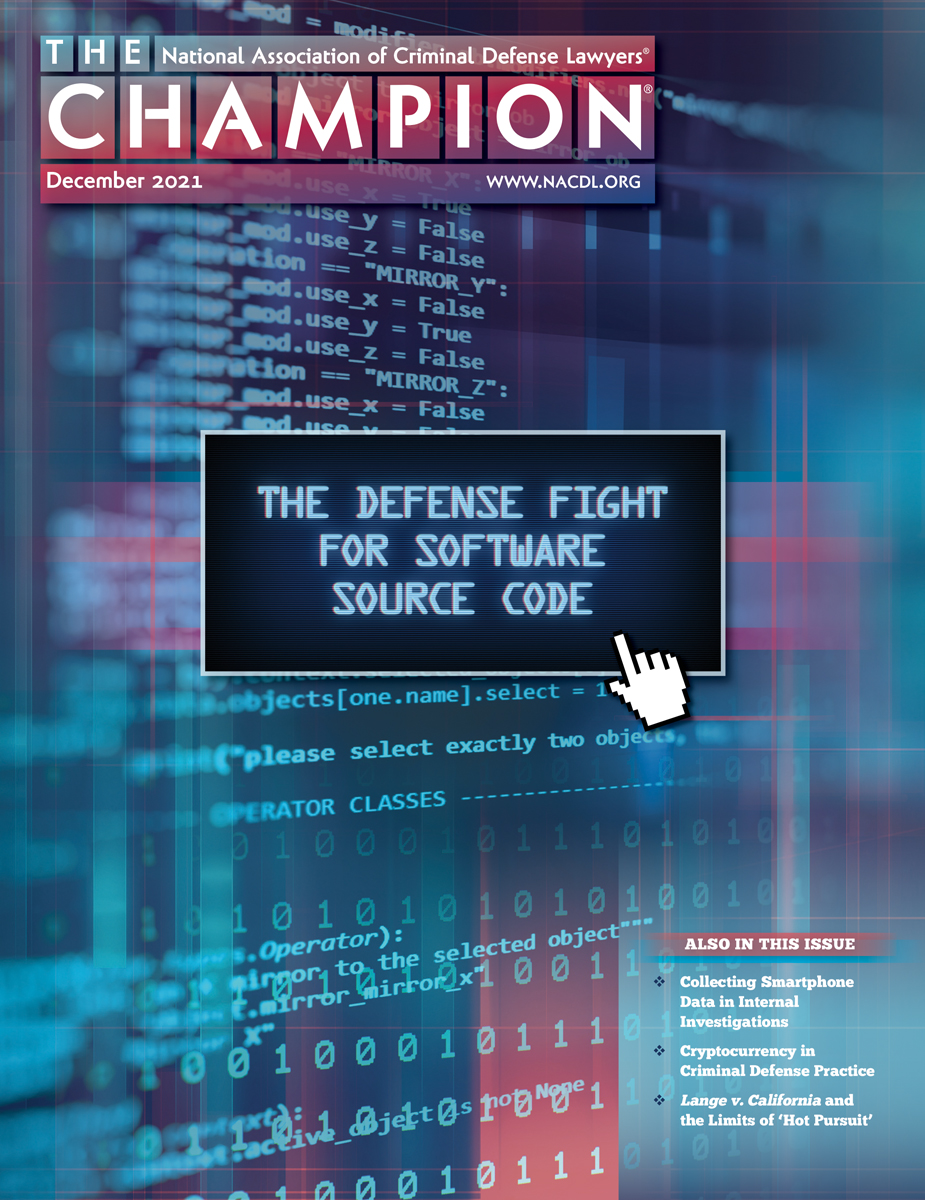December 2021

Why should attorneys want the source code for forensic technology involved in their cases? How can they get it?
Articles in this Issue
-
Affiliate News
What events are NACDL affiliates hosting this month? Find out here.
-
Check the Sources: Why Secret Computer Code Matters and How Defense Counsel Can Get It
Attorneys and courts should not simply trust that computer programs are reliable. Why should litigants have faith in evidence that purports to be accurate when the inner workings of the computer program that produced the evidence are shrouded in mystery? Source code review is necessary for a complete assessment of a program’s reliability. Tamar Lerer discusses pretrial strategies to help obtain source code when a program has not been demonstrated to be reliable.
-
Decoding the Crypto Space: Understanding Cryptocurrency in Today’s Criminal Defense Practice
The government’s attempts to regulate cryptocurrencies with existing statutes and traditional law enforcement approaches have resulted in confusing and inconsistent outcomes. Attorneys have faced difficulty in advising clients on how to lawfully use, purchase, and sell cryptocurrencies, particularly in light of the uncertainty concerning how to define and determine which agency has jurisdiction over digital currencies and transactions. What are the trends in prosecution and regulation?
-
From the President: There but for the Grace of God Go I or, Frank Carson, an Unlikely Martyr
in Modesto
Frank Carson is a classic example of a defense lawyer who stood strong and held the line for liberty every day in courtrooms across the United States.
-
Get Smart! The Smartphone Conundrum in Internal Investigations
Whether a defense attorney in an internal investigation represents an employer or an employee, it is imperative that the attorney is prepared for the issues that arise when collecting data from a personal smartphone. The authors outline the nearly infinite universe of potentially collectible data that exists within smartphones. Also, they provide an overview of the rights and interests of the employer and employee. Finally, the authors provide a cautionary note about the scope of internal investigations in which a private company becomes a de facto arm of the government.
-
Getting Scholarship Into Court Project
The “Getting Scholarship Into Court Project” brings helpful law review articles and other writings to the attention of criminal defense attorneys. The project’s purpose is to identify scholarship that will be especially useful to courts and practitioners. Summarized on this page are articles the project’s advisory board recommends that practicing lawyers take the time to read. To recommend articles for this column, contact Professor Jenny Carroll (jcarroll@law.ua.edu).
-
NACDL News: Knoxville, TN, Attorney Stephen Ross Johnson Sworn in as Treasurer of NACDL
NACDL News for December 2021
-
NACDL News: NACDL Presents Six Awards During the NFCJ 20th Anniversary Gala
NACDL News for December 2021
-
Search & Seizure Commentary: Lange v. California and the Limits of ‘Hot Pursuit’
and ‘Exigent Circumstances’ When Police Confront the Sanctity of the Home
Does the pursuit of a fleeing misdemeanor suspect always qualify as an exigent circumstance that permits warrantless entry into a home? In Lange v. California, the Supreme Court held that it does not.
-
Verbatim: The Tradition of Passionate Advocacy
Enlightened advocacy is the unifying thread of what the Foundation for Criminal Justice does. It includes advocacy for the individual and advocacy for reform.
